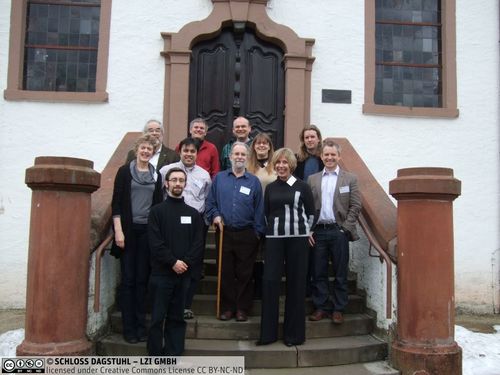Research Meeting 10082
Locating Biology: The Development and Application of an Environment Ontology
( Feb 21 – Feb 26, 2010 )
Permalink
Organizers
- Michael Ashburner (University of Cambridge, GB)
- Christian Freksa (Universität Bremen, DE)
- Suzanna Lewis (Lawrence Berkeley National Laboratory, US)
- Norman Morrison (University of Manchester, GB)
Contact
- Annette Beyer (for administrative matters)
Schedule
From remote sensing devices to high-throughput meta-genomic techniques, technology is revolutionizing environmental science, producing huge volumes of data that were unimaginable only a generation ago. Environmental data now represents decades of investment by governmental bodies, commercial businesses and higher education institutions. However, for those researchers outside a particular survey or initiative, data are not easy to obtain, understand, or reuse.
Key to the discovery and retrieval of environmental data is the identification and robust capture of meta-data (data about data). Indeed, environmental meta-data have been identified as an essential and pervasive theme within the Infrastructure for Spatial Information in the European Community (INSPIRE,) http://inspire.jrc.ec.europa.eu directive (Annex III) and The Shared Environmental Information System (SEIS,http://ec.europa.eu/environment/seis). There is increasing recognition therefore that the scientific community would benefit from the development of a common reference framework for describing environmental information.
The successes of the Gene Ontology and similar artifacts in other areas of biology have shown that an ontological framework can enable more powerful semantic retrieval and integration of biomedical data. We strongly believe that the development and application of an Environment Ontology can and will bring similar benefits to the environmental community.
Preliminary work has begun to provide an integrated approach to the problem of linking environmental data under the umbrella of the Environment Ontology Consortium ( http://www.environmentontology.org). The Environment Ontology (EnvO) ontology currently has around 1200 terms organized into four main branches. EnvO is complemented by an open-source gazetteer project, GAZ that now contains over 80,000 place names. The aims of these efforts are to support the semantically consistent description of, and computational reasoning over, environmental information associated with biological data of any organism or biological sample.
A key objective of this seminar is to promote new discovery, interoperability and integration opportunities for environmental research data through the uptake, application and development of EnvO (environments) and Gaz (places), including the identification of mechanisms for coordination and dissemination of these artifacts among potential user communities.
Classification
- Spatial Information Science
- Biology
- Semantics
- Logic
Keywords
- Formal ontology
- standardization
- data integration
- information retrieval
- spatial reasoning
- meta-genomics
- habitat
- biome
- gazetteer
- environment
- geography


